by Sandra Gulland | Oct 24, 2009 | Adventures of a Writing Life |
What can be done to avoid bad covers? What do you do?
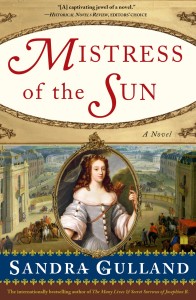
I’m still in shock from the arrival, yesterday, of a box of the French edition of my novel, Mistress of the Sun. My heroine, Petite (based on the real-life and blonde Lousie de La Vallière), is portrayed as a woman with jet black hair.
Forget all the historical inaccuracies: that her head is uncovered and her hair loose over her shoulders; that she’s wearing what appears to be a ball gown on horseback. Forget that the ugly horse looks half-dead. Forget the fact that the cover screams: This is not a novel to be taken seriously! And that it seems to be aimed at young adults.
Forget the pages and the footnotes added.
Forget all that and just concentrate on her heroine’s glaring black hair!
What can one do? (In the contract I was given approval of the cover, but this was overlooked.)
Here are some thoughts for the future:
1) Ask to see the publisher’s catalogue before agreeing to sell the foreign rights.
2) Get some understanding of how this publisher “sees” my book, how they intend to position it.
3) Make a personal connection with the editor who will be seeing it through.
4) Provide a brief crib-sheet (in basic English) to the art department on possible approaches to a cover, including a basic description of the main character.
5) Ask when the cover will be ready. Remind them that you are to see it.
In short, get involved.
Not that there’s ever time! Does one just sign, let it go and pray for the best? This is not my first bad experience, but it’s a dilly.
by Sandra Gulland | Oct 17, 2009 | Adventures of a Writing Life |
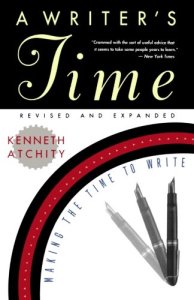
I remember reading in Kenneth Atchity‘s fine book, A Writer’s Time, that if you’re wondering if you’re coming to the end of a writing project, you aren’t. That approaching the end is so all-consuming, there can be no doubt.
Somehow, I always forget this, and then bam, there I am, in the wind-tunnel, waking at 3:00 in the night, and heading for the computer. Typing fifteen hours at a stretch. And then, after days and days of this, somewhat stunned, I look at a paragraph and think: this is the end.
I stagger away from the computer, take a few deep breaths. I come back: is it? Yes.
I go have a nap. I rise, and look at the clutter that has arisen around me, the nest of my obsession. I have a bath, blog, breathe. I feel just a little bit lost, but I’ll recover, no doubt: 125,490 words in 16 weeks, nearly 8000 words a week.
Well. That’s a bit too intense, I think, looking back. I’m not sure I would set this pace again. But it’s done, for now, and I’m pleased.
by Sandra Gulland | Oct 12, 2009 | Adventures of a Writing Life |

I do love Margaret Atwood interviews. She is invariably entertaining. For this one today on the L.A. Times blog:
Interviewer: Your book “The Handmaid’s Tale” has become a seminal feminist work taught in universities all over.
Atwood: You know you’ve really made it when people start dressing up like that on Halloween.
I’m in post-Thanksgiving-dinner recovery: bloated and tired. The dishes are almost done, the furniture almost all back in place. My husband is simmering the turkey carcass for stock. A bit of left-over pumpkin pie with whipped cream was perhaps not exactly what I needed … but impossible to resist.
I’m on my last two chapters (which may expand to three or four). I didn’t expect too much of myself this holiday weekend, but I did manage to write each morning. And now, with the coast clear, I could dive back in, but I don’t feel ready. I had hoped to be finished by this weekend, and although that didn’t happen, I do feel that I can finish over the coming two weeks … weeks which will get progressively busier as we prepare to move to Mexico for the winter months.
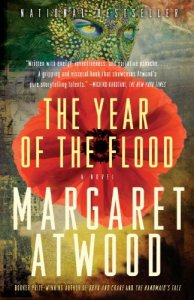
So—for today: research, catalogue books, read Atwood’s The Year of the Flood, nap?
Answer: all of the above, or rather …
To PO’THER. v.a. To make a blustering ineffectual effort.
He that loves reading and writing, yet finds certain seasons
wherein those things have no relish, only pothers and wearies
himself to no purpose. Locke.
by Sandra Gulland | Oct 7, 2009 | Adventures of a Writing Life |
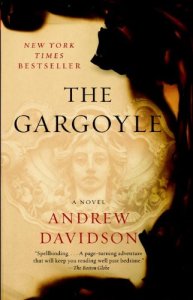
I’m getting through some big, tough scenes as I near the end of this first draft. Galloping toward the finish is gripping in the same way as when reading a novel. This draft will no doubt be a mess when I read it through—it will need major surgery—but overall, I’m pleased. I think I will have something to work with.

In my off-time, I check Twitter, the blogs I follow, Facebook. I just read a fascinating on-line conversation Karen Essex posted to Facebook, a conversation between Karen (author of, among other novels, Stealing Athena) and Andrew Davidson (author of The Gargoyle). There’s a lot in this conversation about the writing process, and, most interestingly, about experiences of talking with (dead) historical characters: read—or listen—to it here.
I especially liked this quote from Essex:
So the challenge in writing historically based fiction is to take what really happened and without sacrificing history, and without just making things up, or ill-using history or historical characters, you have to figure out how to tell a story with a narrative out of a life that didn’t really unfold as one.
No truer words … .
by Sandra Gulland | Oct 1, 2009 | Adventures of a Writing Life |
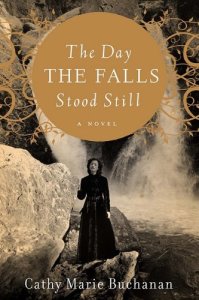
The Cathy Marie Buchanan‘s teleconference, the culmination of her blog tour for The Day the Falls Stood Still, was lots of fun. A number of wonderful book bloggers were present, plus, of course, Cathy and I (briefly), and master of ceremonies, Diane.
You can listen to the conversation here.
Now that I can see how it works, I can see a lot of potential for this type of live author meet (without the airfare).








